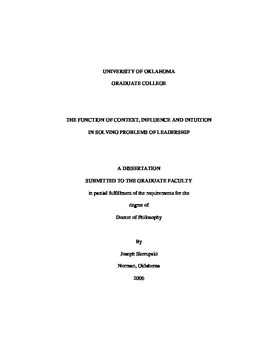| dc.contributor.advisor | Butler, Charles, | en_US |
| dc.contributor.author | Skorupski, Joseph. | en_US |
| dc.date.accessioned | 2013-08-16T12:20:01Z | |
| dc.date.available | 2013-08-16T12:20:01Z | |
| dc.date.issued | 2006 | en_US |
| dc.identifier.uri | https://hdl.handle.net/11244/975 | |
| dc.description.abstract | The purpose of the study was to determine if training novice leaders to identify context, influence and intuition embedded in a real life problem-solving narrative as affecting the explicitness they used in describing how they would solve a problem of practice. It was hypothesized that novice leaders who received training would provide more explicit explanations of how they would solve a problem of practice. Research suggests that learning how to identify context, influence, and intuition cues in narratives of leadership practice may enable pre-service leaders to increase the explicitness of their explanation of the process they use to solve problems of practice. Skills, cognitive, and psychodynamic theories of leadership development are used as the theoretical basis for the research. Educators working for the Department of Defense Dependent Schools (DoDDS) were randomly assigned to groups that received a pre-test scenario, post-test scenario, training to identify context, influence and intuition or a combination of all three. No significant differences were found between the four groups. The differences between the group that received only training and the post-test scenario and the other groups were in the direction suggested by cognitive and psychodynamic leadership theory. Although not statistically significant the observation that the description of the solution for the treatment group not receiving the pre-test was more detailed than the solution description for the treatment group that received both the pre-test and the post-test suggests the pre-test may have had a dampening effect on the post-test solution. Conclusions about the impact of minimal training on explanation explicitness and the dampening effect of the pre-test scenario are discussed within the framework of Howard Gardner's concept of the "unschooled mind" (1991). Recommendations are made for replicating the study with public sector educators and the use of the procedures as a way of providing pre-service leaders problem-solving experience. | en_US |
| dc.format.extent | viii, 87 leaves ; | en_US |
| dc.subject | Education, Administration. | en_US |
| dc.subject | Educational leadership Study and teaching. | en_US |
| dc.subject | Education, Teacher Training. | en_US |
| dc.title | The function of context, influence and intuition in solving problems of leadership. | en_US |
| dc.type | Thesis | en_US |
| dc.thesis.degree | Ph.D. | en_US |
| dc.thesis.degreeDiscipline | Department of Communication | en_US |
| dc.note | Source: Dissertation Abstracts International, Volume: 67-01, Section: A, page: 0056. | en_US |
| dc.note | Adviser: Charles Butler. | en_US |
| ou.identifier | (UMI)AAI3206240 | en_US |
| ou.group | College of Arts and Sciences::Department of Communication | |
